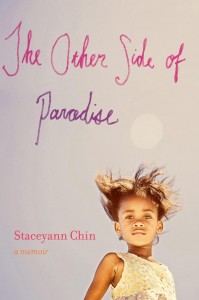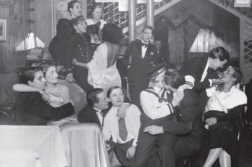 The Other Side of Paradise
The Other Side of Paradise
by Staceyann Chin
Scribner. 288 pages, $24.
PERFORMER AND AUTHOR Staceyann Chin made her debut two months early, as she explains in this new memoir. Her mother, Hazel, who claimed that she didn’t know she was with child, gave birth on the floor of their small, rented house in Lottery, Jamaica, in her seventh month of pregnancy. The baby’s deaf, elderly grandmother refused to believe that the tiny child had to die. “Me just tell everybody fi keep them mouth shut because this little girl here going to live and live and live,” she said.
But a year later, when Grandma could no longer pay the rent, the three of them moved in with the family. Uncle Harold was a policeman with a shiny car. Aunt June was abusive, especially to Staceyann, whom June thought too willful. Beatings were a common occurrence for the little girl, even as Harold and June’s own children got away with much of the same behavior. Staceyann hid bruises and cuts from her family and schoolmates, although her grandmother eventually discovered the abuse but was fearful and powerless to stop it. When Staceyann was eleven, Aunt June had had enough, and shipped the girl to yet another relative, this one in Paradise, Jamaica.
The town was not aptly named. The house was filthy and cramped. Staceyann learned to sleep wrapped in a sheet to protect herself from being raped by the young men of the house. School was her only refuge, though she had to hide her life and household from classmates. Yet the willfulness never left her. Instead, it turned to strength.
Reading The Other Side of Paradise, like the lives it describes, is something of a struggle—increasingly so as the book goes on. The first part of is beautiful and peaceful. The dialogue is written with a perfect island lilt, lush with accent, so vivid that you can almost hear it. The descriptions of the land and the people, however poverty-stricken, make it seem a bit like paradise. The middle of this book is painful but triumphant. Readers may grimace at Chin’s matter-of-fact descriptions of abuse at the hands of her “relatives.” We’re heartened as we watch her find her way, despite her living conditions, and the roadblocks she overcomes. And we cheer because we know that author Staceyann Chin is going to persevere, and her spunkiness is exactly what we want to see.
But the ending of this book is something of a disappointment. Chin’s anger appears so quickly that it may catch you off guard. Her revelation that she’s a lesbian is somewhat expected—particularly if you know about her from her performances—but it feels as if she’s daring readers to oppose her. Everything up to the last few dozen pages of this book projects strength and empowerment, but this spirit of overcoming odds is lost in the final chapters. Still, this reversal should not dissuade readers from taking on this otherwise triumphant memoir.







